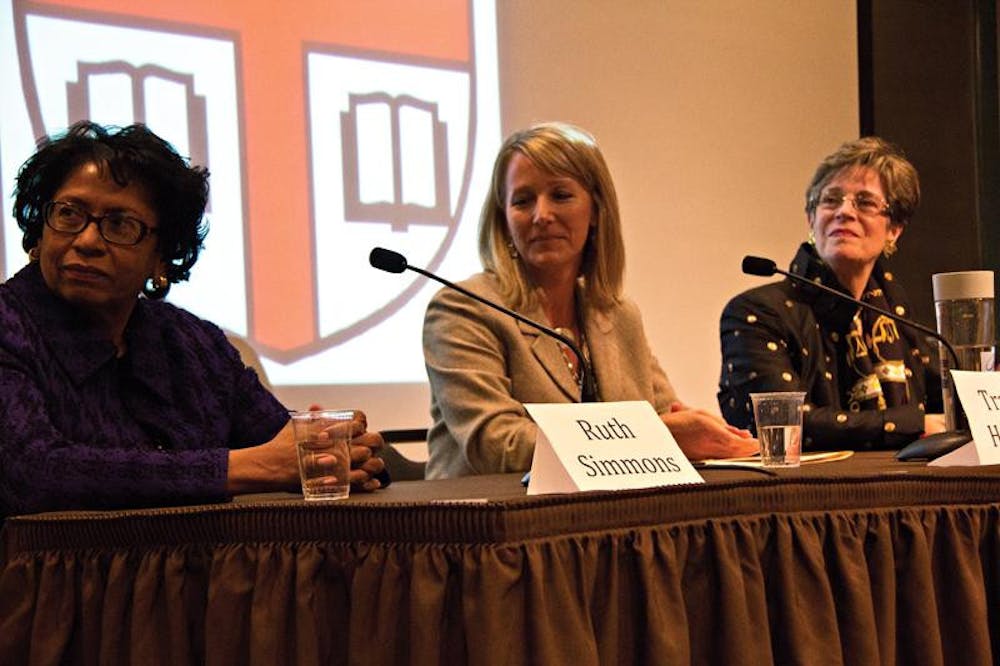Correction appended.
President Ruth Simmons and fellow successful businesswomen gave sound advice to all students - not just females - interested in entering the corporate world at a discussion yesterday. Besides Simmons, the panelists at the event, called "Women in the Corporate World: Breaking the Glass Ceiling," were Martha Goss '71 P '04, the former CFO of Booz Allen Hamilton, and Tracy Harlow, the senior director of Global Associate Communications at Walmart.
The panel was organized by the student group, Smart Woman Securities, and sponsored by the Commerce, Organizations and Entrepreneurship department.
Maria Carkovic, director of the COE department, moderated the discussion. Yingsi Zhang '12, a co-founder of Smart Woman Securities, said that Carkovic was an ideal choice for moderator because the COE department has always supported her group, the Brown chapter of a nationwide nonprofit that provides finance education to undergraduate women through lectures and speaker series.
The event attracted a moderately sized and predominantly female audience that occupied about a quarter of Salomon 001.
Carkovic began by introducing the panelists, who went on to describe their career trajectories and some of the challenges they faced as females in the male-dominated corporate world, such as confronting gender stereotypes and balancing family lives with careers.
Simmons described the struggles she endured at the beginning of her career, at a time when penetrating the "glass ceiling" was practically impossible for African Americans. She said she set low expectations for her future and aspired only to live a life that was different from that of her parents'. Simmons originally reasoned she would be satisfied if she could complete enough schooling to get an office job, but she fell in love with French in college. She chose to pursue a career as a professor, even though the majority of her peers emphasized practicality and activism in their career paths.
"I pretty much lived my life with the assumption that wherever I am, I will have to prove myself again and again," Simmons said.
"Many of us are fortunate enough to be given that by virtue of how we look or where we come from."
Students were inspired by Simmons' story of breaking through the glass ceiling.
"The idea that when she was our age, she didn't believe that she would have these opportunities, made me feel extremely privileged," said Rie Ohta '13.
During her introduction, Goss described her reasons for retiring from her full-time job in order to work on small corporate boards.
"When you're in the corporate world, you're competing against your peers even if they're your friends," she said. "On corporate boards, you have to work together. It's rewarding because collegiality is required. If I don't say something at a meeting, then the other board members will ask what I think about an issue. It gives me pleasure that my opinion counts and they want my input on all these issues."
Simmons also described her time working on corporate boards, saying the most important lesson she learned is that "the solution is definitely not to retreat."
Simmons emphasized women should not be afraid to set their own standards in the workplace, such as requesting specific hours to make family lives easier. Women are often too quick to accept what they are given in the workplace and can feel trapped as a result, she said.
"I can tell you that leaders don't play by the rules. If you want to advance, you have to play by your own rules," Simmons said. "Minorities and women are often afraid to paint outside the lines because they don't want to be seen as problematic or different. They want to be seen as compliant. But that's not the way to break through."
Harlow also spoke about the importance of open communication between employees and their bosses and stated she is happy to communicate in this way with her staff.
"It's terrifying at first, but it's actually okay because so many companies today are enabling their employees and associates to get the job done," she said. "It's no longer about eight to five - it's about getting the job done."
The panelists also advised students on where to find mentors. Goss stated that peers make excellent mentors to each other. Harlow mentioned that many corporations integrate mentoring systems into their companies. Simmons stressed that students should search for the right mentor - someone who does not simply "provide approbation" but is honest and gives genuine criticism. Simmons said without the right type of mentor, she would have continued to make the kind of mistakes that would have kept her from advancing.
Panelists also discussed double standards women face and the importance of their presentation and composure in the corporate world. Though the panelists agreed that the situation for women in that sphere has improved, Simmons said that even at Brown, she still often sees women's intellect dismissed and their opinions questioned.
Many students said they found the discussion informative and inspiring.
"It had a lot of valuable lessons for anyone going into the business world," said Patrick Temple '12. "I thought they said a lot of interesting things, particularly about the idea of being assertive."
Ohta described the panel as "illuminative."
"It's almost a shame that they catered toward the corporate world and didn't get as many people to come as they could have, considering how universal the advice of the panelists was," she said.
A previous version of this article called the student group that organized the panel Smart Women Securities. In fact, the group is Smart Woman Securities. The Herald regrets the error.





